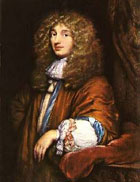Physicists, astronomers, architects, geometricians, mathematicians, chronometer-makers, watchmakers: these are just some of the interested people who, through the years, have displayed a passion for the measurement of time. Their research led to major discoveries and inventions that are still relevant today. Whether physical or geometrical theories, natural laws or mechanical applications, their fundamental contributions have all made it possible to measure time with greater accuracy, to create timepieces to ever higher specifications while allowing aesthetic qualities to become more refined, and even to design increasingly efficient and modern production methods.

Christian Huygens
(1629 - 1695)
Dutch physicist, geometer and astronomer. Inventor of the pendulum clock, the cycloidal pendulum, the balance-spring for watches, among others. Author of scientific horological works. Member of the Académie des Sciences, Paris, and Fellow of the Royal Society, London. Huygens may be regarded as the father of scientific horology.


 Knowledge
Knowledge